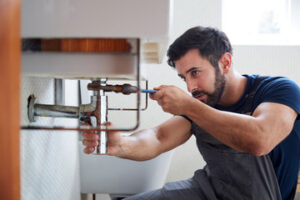Showers and baths are a staple of modern life, and they would be impossible without plumbing professionals. They install and repair the pipes, fixtures, and appliances that allow for water supply, waste removal, and heating. Contact Plumber Longview WA for professional help.

They also interpret building codes and blueprints and perform safety inspections. But despite what you might see on TV, plumbing isn’t a dirty or dangerous profession.
The job duties of a plumber involve the installation, maintenance, and repair of plumbing appliances, fixtures, and systems. They work on pipes used for drinking water, sewage, drainage, and heating and cooling. Plumbers also perform light construction and carpentry tasks. Some specialize in areas like natural gas lines or steam fitting. These professionals are required to read blueprints and understand building codes in order to properly install plumbing fixtures. They also must be able to troubleshoot problems and identify solutions.
Plumbers typically need a high school diploma or equivalent. They may also choose to complete a vocational school program or an apprenticeship to gain practical experience. After completing an apprenticeship, they must pass a state exam to become licensed as a journeyman plumber. Some states require that plumbers be certified by a professional organization or trade union. Continuing education is also important for keeping up with new technologies and plumbing code updates.
Journeyman level plumbing work involves installing, repairing and maintaining heating, water, sewer, drain, venting, and gas line systems in University buildings. This includes opening clogged drains and toilets, adjusting faucets, repairing showerheads and tubs, replacing washers in faucets and toilets, and locating underground piping. These professionals also inspect and test plumbing systems to ensure proper operation and safety.
In addition to performing regular maintenance, plumbers also have a duty to respond to emergency calls from clients. This can include removing debris from blocked drains, restoring water and sewer systems after floods or fires, and resolving other issues that affect public health and safety.
Plumbers are responsible for installing, repairing, and maintaining the piping systems in residential and commercial spaces. They use a variety of tools and equipment to perform their duties, including power and hand tools. This job requires manual dexterity and the ability to stand or walk for extended periods of time. Plumbers must also be able to climb stairs and navigate narrow spaces.
Plumbers must be able to follow directions and keep records. They also need to be able to work effectively in teams and under pressure. During interviews, it is important to ask candidates about their career aspirations and how they plan to advance in their field. This can help determine if the candidate is committed to the profession and has the potential for long-term success.
Education and Training Requirements
Plumbing is a trade that requires extensive training and education. Most plumbers are trained through an apprenticeship, which lasts from four to five years and combines on-the-job experience with classroom instruction. During this time, apprentices learn the fundamentals of plumbing and become familiar with various tools and equipment. They also learn about local codes and regulations and how to read blueprints. After completing an apprenticeship, plumbers must obtain a license to work independently.
Many vocational schools and community colleges offer programs that teach the skills needed for a successful career as a plumber. These courses include mathematics, science, and other relevant subjects. Some programs also include hands-on labs that give students practical experience. Plumbers must also have good critical thinking skills to solve complex problems. They must also be able to listen carefully to customers and understand their concerns.
A high school diploma is the minimum educational requirement for becoming a plumber. However, many people choose to attend a trade or technical school to obtain their training. These programs often include specialized coursework in areas like local plumbing codes and regulations, blueprint reading, and safety practices. A degree from a trade or technical school can open up more opportunities for advancement, including positions in project management and sales.
Another way to get the necessary education and training to be a plumber is to work as a plumber’s assistant. In New York, this is a great way to gain the experience and knowledge you need to succeed in this field. It is also a good option for those who are not interested in spending a lot of money to get their training.
To become a licensed journey plumber in New York, you must complete a plumbing apprenticeship program and work as a plumber for at least 10,000 hours. Additionally, you must pass a written exam. To be a master plumber, you must complete 12,000 hours of experience and pass a written exam. You must also submit a background check and pass a drug test. These requirements can be difficult to meet, but they are essential for a successful career in the field of plumbing.
Work Environment
The work environment for plumbers can be challenging and fast-paced. Plumbers are often on-call and must be available to address emergency situations, including clogged toilets and broken water heaters. They may also have to travel between different locations. Because of this, plumbers need to be comfortable working with a variety of tools and materials in a diverse range of conditions.
Plumbers are usually required to wear protective clothing and gear, such as safety goggles and gloves. They must be able to handle working in tight spaces and around hazardous materials, such as lead, sulfur dioxide, solvents, silica, and soldering. In addition, they must be able to read and interpret blueprints and other drawings. Depending on the nature of their job, plumbers may also need to collaborate with other professionals, such as construction teams and architects, to ensure that plumbing systems are integrated into building projects correctly and meet all relevant standards and regulations.
Typical work tasks for a plumber include installing and connecting pipes, fixtures, and appliances such as sinks, toilets, and water heaters. They also repair and maintain these systems to ensure that they are functioning properly. Other duties may include detecting and repairing leaks, clearing obstructions from drains and pipes, and ensuring that all components are safe and in compliance with applicable codes and regulations. Plumbers often perform these tasks in residential, commercial, and industrial settings.
In some cases, plumbers may be required to install and connect gas lines. This can involve working with hazardous materials and equipment, such as gas compressors and piping, gas meters, and safety devices. Plumbers must also be knowledgeable about various types of fuel sources and how to safely operate and connect them to plumbing systems.
Many plumbers start out their careers as plumber’s helpers, which can be a good way to get a feel for the work and learn the necessary skills before becoming a licensed plumber. They can prepare and clean work areas, assist with pipe cutting and installation, and help review blueprints. Moreover, they can help with other administrative functions, such as preparing cost estimates and documentation.
Salary
Plumbing is a trade that requires physical stamina and an ability to work with a wide range of materials. It is also a career that can be quite lucrative, especially for those who have the right skill set and are willing to put in the work.
Plumbers install and repair pipes that supply water and carry waste away from homes and businesses. They may also install plumbing fixtures such as bathtubs, sinks, and toilets, as well as appliances like dishwashers and washing machines. In addition, plumbers may be called on to cut holes in floors and walls, hang steel supports from ceiling joists, and solder pipe connections. They must also have a solid understanding of building regulations and codes.
The salary of a plumber depends on many factors, including geographic location, specialization, and level of experience. Cities with higher populations and larger commercial infrastructures typically pay more than rural areas. Plumbers with specialized skills in areas like backflow prevention, gas pipe installation, and trenchless sewer line repair tend to earn more than those who focus on residential work. Plumbers who are licensed by their state’s regulatory body also usually earn more than those who are not.
Many plumbers belong to labor unions, which negotiate wages on their behalf and often require membership fees. In addition, some states have minimum wage laws that impact the wages of all workers in the trade. A strong national economy typically translates to higher salaries for plumbers, while an economic downturn can lead to lower wages.
There are a number of ways that plumbers can increase their earning potential. One way is by pursuing industry certifications, which can help them stand out from their peers and make them more valuable to employers. Another way is by acquiring new tools and techniques that can improve their productivity and efficiency on the job.
Finally, plumbers can also seek out opportunities to gain experience by working with more experienced colleagues. Whether they are doing this through on-the-job training or by taking classes at a local technical or trade school, this can be an effective way to increase their salary.

